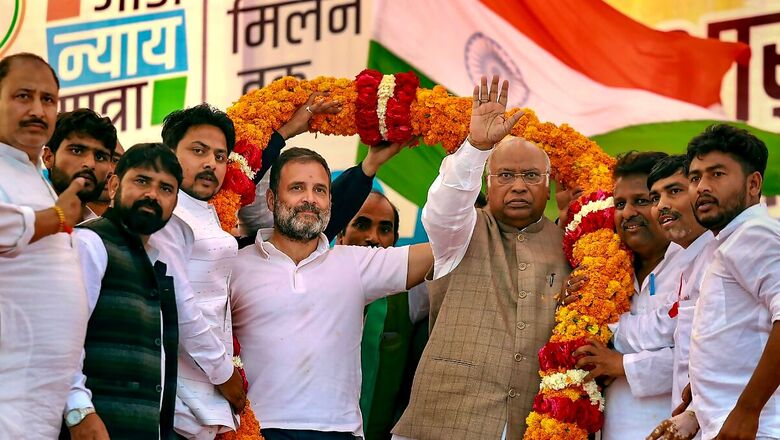
views
In the turbulent landscape of Indian politics, the Congress party finds itself at a critical juncture, grappling with internal turmoil and external challenges. While the party may be quick to point fingers at Prime Minister Narendra Modi and the Bharatiya Janata Party (BJP), the root of its predicament lies within its own entrenched leadership dynamics, particularly the hegemony of the Gandhi family.
Today, as Sonia, Rahul, and Priyanka Gandhi wield significant influence within the party, the reluctance to shoulder accountability for its electoral fortunes looms large. This pivotal moment places Mallikarjun Kharge, the president of the Congress party, at the forefront of decision-making and crisis management. Kharge’s mandate extends beyond mere electoral success; it encompasses the daunting task of preserving party unity and preventing further defections ahead of the 2024 Lok Sabha elections. Despite forging alliances with parties like the AAP and the Samajwadi Party, the burden of maintaining these coalitions falls squarely on Kharge’s shoulders.
Amidst the aftermath of setbacks in certain Rajya Sabha seats and signals of instability in the Himachal Pradesh government, Kharge must navigate treacherous waters and steer the Congress ship toward calmer shores. While the Opposition gears up for political campaigns, Kharge’s primary focus remains crisis mitigation and alliance management. In this high-stakes environment, Kharge‘s leadership will be put to the test as he strives to navigate the Congress party through turbulent waters and emerge stronger, more united, and better equipped to face the formidable challenges that lie ahead.
Kharge’s Challenge in Keeping Congress United
As the Congress braces itself for the 2024 Lok Sabha elections, it finds itself grappling with a wave of defections that threaten to undermine its unity and electoral prospects. From the resignation of former Maharashtra CM Ashok Chavan to swirling rumours of former Madhya Pradesh CM Kamal Nath’s departure and even Himachal Pradesh’s minister Vikramaditya Singh tendering his resignation, the party is facing a tumultuous period of instability.
At the helm of this storm stands Mallikarjun Kharge, tasked with the herculean challenge of holding the Congress party together in the face of mounting dissent and disarray. With defections eroding the party’s strength and credibility, Kharge must navigate treacherous waters and instil confidence among party members.
The defections not only weaken the Congress’ electoral prospects but also threaten to fracture its organisational cohesion and strategic direction. Kharge’s leadership will be put to the test as he seeks to address the grievances of disgruntled members, shore up support within the party ranks, and forge a united front ahead of the crucial elections.
Amidst the tumult, Kharge’s ability to rally the party faithful, inspire confidence, and chart a course forward will be pivotal in determining the Congress’ fortunes in the upcoming Lok Sabha polls. As the political landscape continues to evolve, Kharge’s leadership will be scrutinised, and his success in keeping the Congress united will be a testament to his skill and resilience in the face of adversity.
Kharge’s Burden: Revitalising Congress Beyond Rahul’s Image Makeover
Despite Rahul Gandhi’s Bharat Jodo Nyay Yatra, aimed at rejuvenating the party’s fortunes, its impact remains lacklustre on the ground, overshadowed by the pressing need for substantive groundwork. Rather than channelling energies into grassroots campaigning and policy articulation, the party’s focus has shifted towards revamping Rahul Gandhi’s image—a move fraught with challenges and uncertainties. In this precarious landscape, Mallikarjun Kharge emerges as a central figure tasked with shouldering the burden of orchestrating the party’s resurgence.
His responsibilities extend far beyond mere micro-management; he is entrusted with the herculean task of negotiating with state leadership, fostering unity, and revitalising the Congress’ electoral machinery nationwide. Amidst the clamour for change and rejuvenation, Kharge’s leadership acumen and strategic vision will be put to the test. As the political terrain evolves and electoral battle lines are drawn, the onus is on Kharge to chart a course that transcends mere image makeover, propelling the Congress towards a position of strength and resonance with the electorate.
Kharge’s Challenge Amidst Congress Alliance Dynamics
While alliances with the AAP and Samajwadi Party present strategic opportunities, the onus falls squarely on Congress President Kharge to ensure their cohesion and longevity. Despite mounting pressure and evolving alliances, the Gandhi family’s disinterest in actively nurturing these partnerships casts a shadow of uncertainty. The departure of JDU and RLD from the INDIA bloc, coupled with the TMC’s decision to fight alone, underscores the fragility of Opposition unity and the challenges facing the Congress in maintaining its alliance structure.
In this volatile environment, Kharge assumes a pivotal role as the linchpin of alliance management, tasked with bridging divides, fostering collaboration, and safeguarding the collective interests of the Opposition front. Amidst the ebb and flow of alliances and shifting political allegiances, Kharge’s ability to uphold unity and coherence within the Congress-led coalition will be critical in shaping the outcome of the electoral contest. As the party braces itself for the challenges ahead, Kharge’s stewardship offers a beacon of hope for a cohesive and formidable Opposition front.
Kharge’s Test Amidst Himachal Pradesh Political Crisis
The political turbulence gripping Himachal Pradesh poses a formidable challenge for Kharge, as the stability of the state government under Chief Minister Sukhwinder Singh Sukhu hangs in the balance. The recent setback in the Rajya Sabha elections, with Congress candidate Abhishek Manu Singhvi losing due to cross-voting by party MLAs, exacerbates the crisis, particularly considering Singhvi’s pivotal role within the party due to his legal expertise.
With Himachal Pradesh currently one of only three Congress-ruled states in India, the prospect of government instability ahead of the 2024 general elections looms large, casting a shadow over the party’s electoral prospects. In this precarious scenario, the burden of crisis management falls squarely on Kharge’s shoulders, as the Gandhi family remains aloof from taking direct responsibility.
As Kharge grapples with the exigencies of the Himachal crisis, the efficacy of Congress’ electoral campaign and strategic manoeuvres hangs in the balance. The need to address the crisis without compromising on electoral preparations poses a delicate balancing act for Kharge, highlighting the complexities of leadership in times of adversity. Amidst the storm, his leadership will be put to the test as he navigates the dual challenges of crisis management and electoral strategy.
Crafting A Message
As the BJP solidifies its narrative for the 2024 general elections, centred around the foundation of the Ram Mandir in Ayodhya and the promise of a ‘Ram Rajya,’ the Congress President faces a daunting challenge. While the BJP under Prime Minister Narendra Modi establishes a strong ideological message, the Congress grapples with the need to articulate a compelling narrative that resonates with the electorate.
Kharge’s responsibility is twofold: to craft a message that not only counters the BJP’s narrative but also embodies the ethos and aspirations of the Indian populace. Merely opposing Modi’s leadership is insufficient; the Congress must offer a clear and coherent vision for the nation’s future. This message must strike a delicate balance, aligning with the core values of the Gandhi family’s ideology while remaining inclusive and appealing to a diverse range of voters. Moreover, it must garner support from other Opposition parties within the alliance, necessitating careful negotiation and consensus-building.
As the clock ticks closer to the elections, Kharge must lead the Congress in defining its message—a message that embodies hope, progress, and inclusivity, resonating with the aspirations of every Indian citizen.
The author, a columnist and research scholar, teaches journalism at St. Xavier’s College (autonomous), Kolkata. He tweets at @sayantan_gh. Views expressed in the above piece are personal and solely that of the author. They do not necessarily reflect News18’s views.




















Comments
0 comment